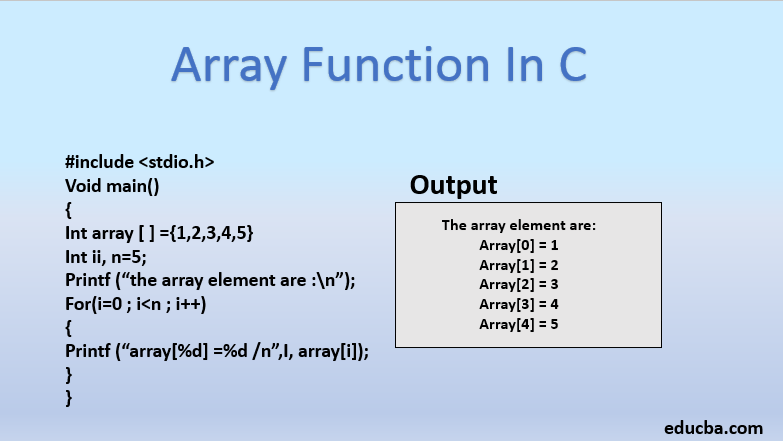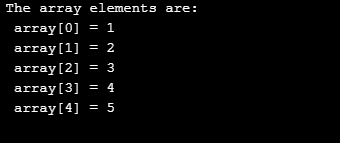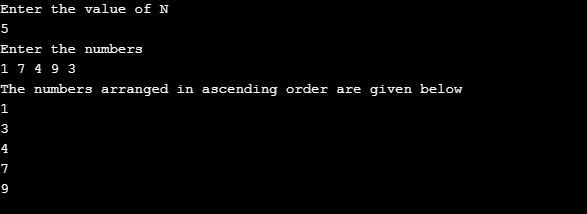Updated May 18, 2023

Introduction to Array Functions in C
Array Functions in C is a data structure with multiple elements of the same data type. The size of an array is fixed, and the elements are collected in a sequential manner. There can be different dimensions of arrays, and C programming does not limit the number of dimensions in an Array.
Different Functions of Array in C
Different functions can be performed on arrays.
1) Traversing
Traversing an Array means going through each element of an Array exactly once. We start from the first element and go to the last element. An example of a program that performs traversing operations on a linear Array is given below in C language.
Code:
#include <stdio.h>
void main()
{
int array[] = {1,2,3,4,5};
int i, n = 5;
printf(" The array elements are: \n " );
for( i=0;i < n; i++)
{
printf(" array[%d] = %d \n " , i, array[i] );
}
}Output:

2) Searching
The search operation finds a particular data item or element in an Array. We can search in an unsorted array with the help of traversal of the Array. The linear traversal from the first element to the last element can be used to search if a given number is present in an Array and can also be used to find its position if present.
This is done by comparing each element with the given element (to be searched). Once the element is found, the search operation is stopped. Here is an example to show a search operation performed on an Array in C
Code:
#include<stdio.h>
int findElement(int arr[], int n, int key)
{
int i;
for (i = 0; i < n; i++)
if (arr[i] == key
return i;
return -1;
}
int main()
{
int arr[] = {1, 4, 0, 6, 3};
int n = sizeof(arr) / sizeof(arr[0]);
int key = 4;
int position = findElement(arr, n, key);
if (position == - 1)
printf("Element not found");
else
printf("Element Found at Position: %d", position + 1 );
return 0;
}Output:
![]()
3) Insertion
Insertion operation is used to add a new element in the Array. When we specify the particular element and position where it will be added to the Array, we perform an insertion operation. However, the size of the Array is not disturbed while performing this operation. An element will be inserted in an array only if it has sufficient space to add it. If the size of an array is full already, a new element cannot be added. An example to show insert operation in an unsorted Array in C.
Code:
#include<stdio.h>
int insertSorted(int arr[], int n, int key, int capacity)
{
if (n >= capacity)
return n;
arr[n] = key;
return (n + 1);
}
int main()
{
int arr[20] = {8, 5, 6, 9, 0, 7} ;
int capacity = sizeof(arr) / sizeof(arr[0]);
int n = 6;
int i, key = 2;
printf("\n Before Insertion: ");
for (i = 0; i < n; i++)
printf("%d ", arr[i]);
n = insertSorted(arr, n, key, capacity);
printf("\n After Insertion: ");
for (i = 0; i < n; i++)
printf("%d ",arr[i]);
return 0;
}Output:

4) Deletion
In the delete operation, the element existing in the Array is searched (using linear search) and deleted, followed by the shifting of elements. The user enters the element’s position to be deleted from the array. The deletion operation, just like the insertion operation, does not affect the size of the array. Also, the position of the element to be deleted should be within the size of the array, since deleting an element beyond the size of Array is impossible. C program to show delete operation in an unsorted array.
Code:
#include<stdio.h>
int findElement(int arr[], int n, int key);
int deleteElement(int arr[], int n, int key)
{
int pos = findElement(arr, n, key);
if (pos == - 1)
{
printf("Element not found");
return n;}
int i;
for (i = pos; i < n - 1; i++)
arr[i] = arr[i + 1];
return n - 1;
}
int findElement(int arr[], int n, int key)
{
int i;
for (i = 0; i < n; i++)
if (arr[i] == key)
return i;return - 1;
}
int main()
{
int i;
int arr[] = {1, 5, 3, 4, 2};
int n = sizeof(arr) / sizeof(arr[0]);
int key = 3;
printf("Array before deletion\n");
for (i = 0; i < n; i++)
printf("%d ", arr[i]);
n = deleteElement(arr, n, key);
printf("\nArray after deletion\n");
for (i = 0; i < n; i++)
printf("%d ", arr[i]);
return 0;
}Output:

5) Sorting
This operation is performed to sort an Array into a fixed order, i.e., ascending or descending. Here is an example of a sort operation on an Array in C
Code:
#include <stdio.h>
void main()
{
int i, j, a, n, number[30];
printf("Enter the value of N \n");
scanf("%d", &n);
printf("Enter the numbers \n");
for (i = 0; i < n; ++i)
scanf("%d", &number[i]);
for (i = 0; i < n; ++i)
{
for (j = i + 1; j < n; ++j)
{
if (number[i] > number[j])
{
a = number[i];
number[i] = number[j];
number[j] = a;
}
}
}
printf("The numbers arranged in ascending order are given below \n");
for (i = 0; i < n; ++i)
printf("%d\n", number[i]);
}Output:

Different Ways of Sorting an Array
Below are the different sorting methods for Array:
1) Bubble Sort
Bubble sort compares all the elements and sorts them based on their values. It starts by comparing the first element with the second; if the first element is greater than the second element, it will swap both elements and compare the second and third elements, and so on.
2) Selection Sort
The basic idea behind selection sort is finding the least element in the unsorted array and replacing it with the first element. Then continue the same process with the rest of the unsorted array, i.e., from the second position, the third, and so on.
3) Merge Sort
This method of sorting is based on the divide and conquer technique. It splits the array into two equal subarrays and continues until each subarray contains a single element, then merges them in a sorted manner resulting in a sorted array.
4) Insertion Sort
In insertion sort, we start with the second element. The array elements are compared with each other in a sequential manner. The current element(the value to be sorted) is compared with all the elements in the sorted subarray. All the elements in the sorted subarray greater than the current element are shifted, and the current value is inserted. This process is repeated until the whole array is sorted.
5) Quick Sort
Like the merge sort, Quicksort is also based on the divide and conquer algorithm. This method picks an element as the pivot (generally the first element). Then, partitions of an array are made around the picked pivot i.e., all the elements less than the pivot will form one sub-array, and all the elements greater than the pivot will form another. The procedure is repeated with the sub-arrays until the whole array is sorted.
6) Heap Sort
The algorithm of heap sort is based on the comparison. The maximum element is selected and placed in the end position. Then the second largest element is found and placed in the second last position. This process is repeated for all the elements.
Recommended Articles
This is a guide to Array Functions in C. Here we discuss the basic concept and different functions and ways of sorting an Array respectively. You can also go through our other related articles to learn more –


